There are many ways to protect a commercial or residential building from the elements. To help accomplish this, the roof is the single most important feature of any structure, as it is responsible for dispersing rainfall, snow, and hail, as well as acting as a barrier against UV damage from direct sunlight.
…not to mention falling debris!
This means that the materials used in roofing must be resilient, durable, cost-effective, and widely available. This narrows the potential materials for roofing down to a small handful, each of which we’re going to examine in this article.
By learning about the most common roofing materials and what their pros and cons are, you’ll be better informed to make decisions about which materials to choose in the construction of your new roof.
The Roof Pitch Factor
Have you ever noticed that flat-roofed buildings rarely ever have shingles, or that steep roofs almost alwaysdo have shingles? The reason for this because the roof slope—also called ‘pitch’ in the roofing industry—is the deciding factor that dictates what roofing material can and should be used for a specific building.
Here’s how roof pitch varies and why different roofing materials are needed for different roof pitches:
-
Flat roof pitch.
Flat roofs aren’t technically flat, as they need to have at least a slight slope in order to drain water. Flat roofs often have a pitch rating of ½:12 up to 2:12, meaning they slope from ½” every foot to 2 inches every foot.
-
Low-slope roof pitch.
Low-slope roofs range from 2:12 to 4:12 in pitch. Both low-slope and flat roof types require special materials (see below) to prevent leaking.
-
Conventional roof pitch.
Conventional roof pitches range from 4:12 to 9:12 and are candidates for shingle or wood shake roof types, in addition to stone or ceramic tile-style roofs.
-
Steep-slope roof pitch.
Generally speaking, a steep-slope roof is going to have a pitch between 9:12 to 21:12. An example of a steep-slope roof would be the roof that is used on an A-frame cabin or cottage.
Some roofing materials are simply not feasible for use with certain roof types. For example, cedar shake or stone tile roofing materials will simply not work with any roof pitch below 4:12 (for the most part; there may be rare exceptions to this).
So, even though you may want a nice-looking cedar shake roof on that flat or low-slope roof of your residential or commercial building, it’s not going to work. The reason for this is because shingles need slope in order to effectively handle water runoff. If you were to install shingles on a flat roof, it’s likely that water would pool in areas and then leak into the roof underlayment below.
The Best Materials for Each Roof Type
Now that we know how important roof pitch is when determining what materials to use in constructing a new roof, let’s take a look at which materials work best with certain roof types.
Flat or Low-Slope Roofs
For roofs that don’t have much slope at all, there are four roofing material options available. They are:
-
PVC (Polyvinyl Chloride)
-
Metal
-
TPO (Thermoplastic Polyolefin) membrane
-
Modified bitumen
Each of these roofing materials has their own list of pros and cons, including cost, durability, energy efficiency, and more. We won’t get into all that in this article, but you can always contact a member of the A-to-Z Roofing and Exteriors team to learn more about any roofing material you’re considering.
For conventional or steep-slope roof types, there are more numerous options available to you. They include:
-
Asphalt shingling (most affordable, available, and common)
-
Clean slate
-
Clay, concrete, or stone tiling
-
Steel, copper, or aluminum layering
-
Thatching (rare)
Making the choice as to which roofing material to use on a conventional or steep-slope roof is going to require consideration of a number of factors, including cost, local climate, building type, and more.
At A-to-Z Roofing and Exteriors, we don’t suggest making a unilateral decision about which roofing material to use for your new Denver roof without consulting with a roofing professional. We’ve been repairing and replacing roofs in Colorado since 1994, and we have trusted relationships with some of the most reputable roofing manufacturers in the world, including Owens Corning and Decra
To learn more about which roofing material is ideal for your new residential or commercial roof in Denver, contact the roofing professionals at A-to-Z Roofing and Exteriors, today.

